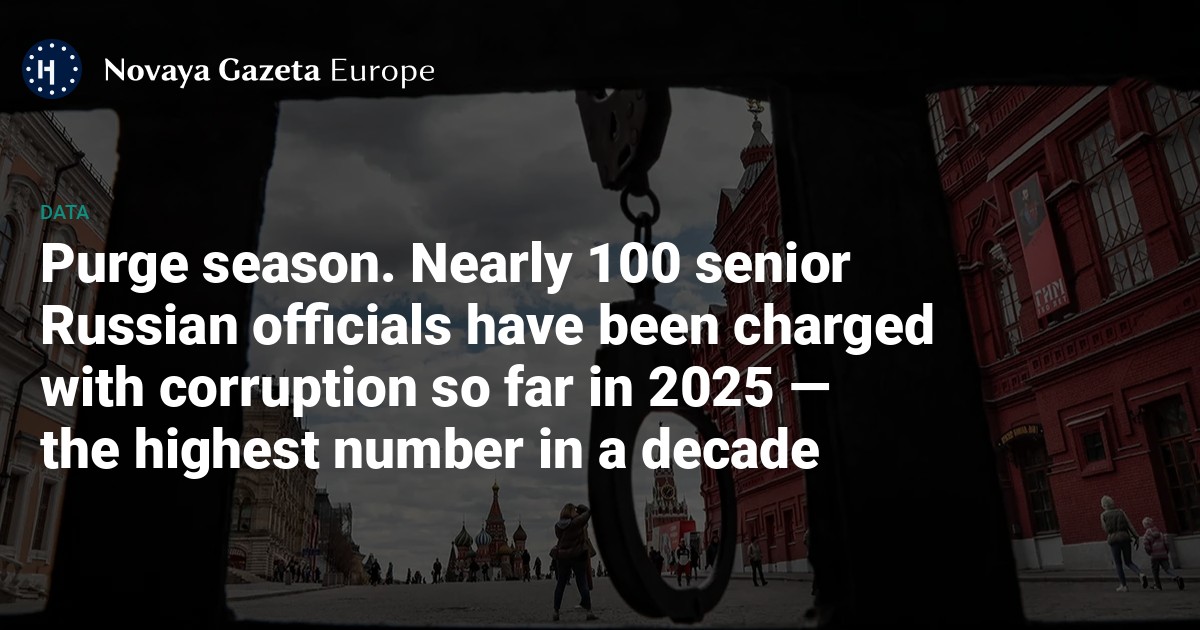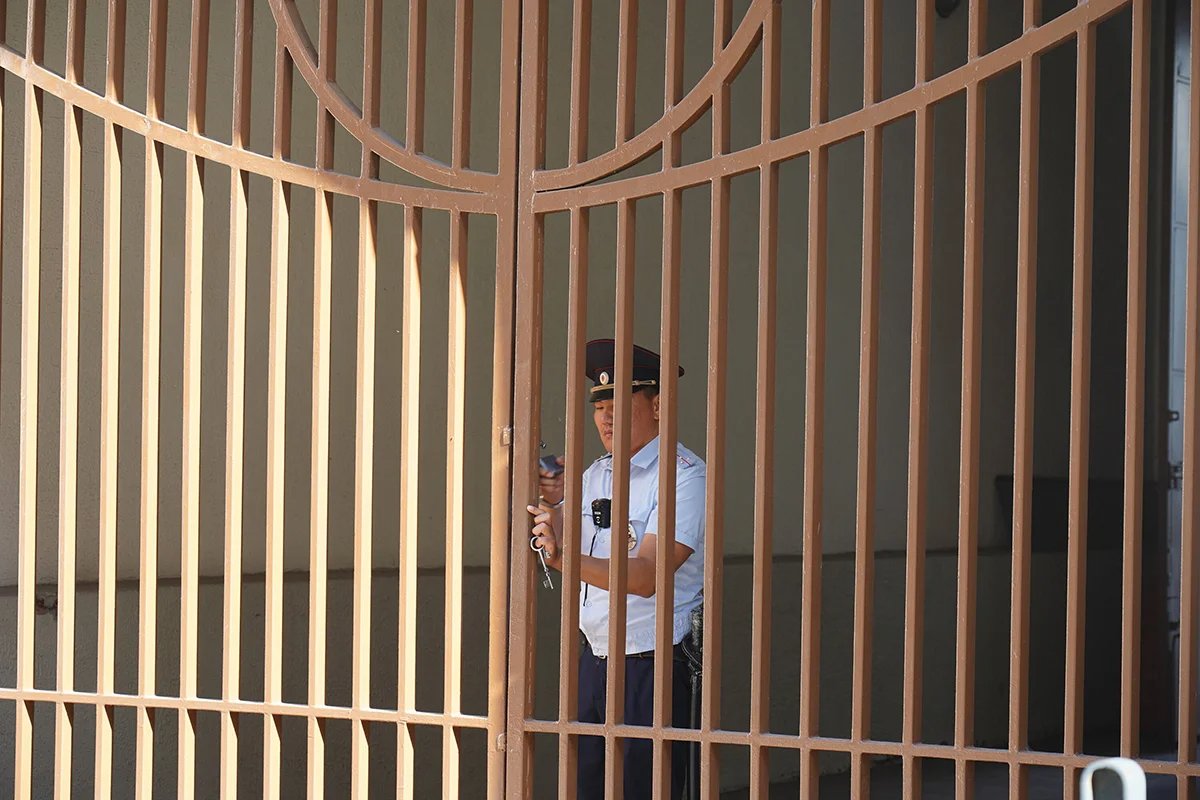



The apparent suicide of former Russian transport minister Roman Starovoyt, who was reportedly facing criminal charges for embezzling billions of rubles during the construction of fortifications on the Ukrainian border, became one of the most widely discussed events of July. But the investigation into Starovoyt and other border region functionaries is just the tip of the iceberg — a sweeping purge of high-ranking Russian officials appears to be underway.
Last week, former Tambov region governor Maksim Yegorov was detained on suspicion of receiving a particularly large bribe. On 22 July, the transport minister of the Novgorod region, Konstantin Kuranov, was arrested on suspicion of the same crime. Just days earlier, on 18 July, Stanislav Shultsev, deputy chairman of the Novgorod regional government — was also taken into custody on large-scale bribery charges.
Since the beginning of 2025, criminal proceedings have been initiated against at least 99 regional lawmakers and senior officials, which amounts to an average of 14 new cases per month.
Novaya Gazeta Europe’s investigation is based on open source intelligence, primarily media reports, and tracks the dates of criminal proceedings being opened rather than final convictions. The research focuses specifically on senior officials, defined here as no lower than deputy heads of federal or regional ministries, or deputy mayors of regional capitals. Our investigation did not include heads of state-owned enterprises or state-funded institutions, such as schools or universities.
“For an autocracy to survive, it must instil fear — but without unleashing full-scale terror.”
Among government departments, law enforcement and security agencies are the hardest hit, being involved in almost a third (28%) of all cases. Next comes construction and housing (18%), followed by trade and industry (11%), and then transport and natural resources (8% each).
Nearly half of all arrests of senior officials over the past 10.5 years have occurred since the start of the full-scale invasion of Ukraine. Arrests of top-level federal officials — from ministers to department heads and their deputies — have even surpassed pre-war levels.
“For an autocracy to survive, it must instil fear — but without unleashing full-scale terror,” says Russian political scientist Yekaterina Schulmann. “What we’re seeing now is that each new arrest is not publicly framed as part of a broader campaign or purge. On the contrary, the system avoids that language. Meanwhile, growing risks for officials, the redistribution of assets, and the inability to leave the country safely are among the key destabilising factors in today’s Russia.”
Starovoyt’s death, which was Russia’s most high-profile political suicide in decades, shocked those in government circles, sources told Faridaily, an independent media outlet known for reporting from within Russia’s elite. “It makes you feel like if you end up in the machine, it’ll grind you into dust,” sources told the channel, recalling the recent 13-year sentence for Russia’s former deputy defence minister Timur Ivanov, and the suspicious death of Wagner chief Yevgeny Prigozhin in a plane crash in August 2023.
Against this backdrop, many interpreted Starovoyt’s act not only as a tragedy, but also as a breach of the system’s unwritten rules: “Strangely enough, Starovoyt showed a way out — and now many will consider it possible,” admitted one source.
Parallel to the rise in high-profile cases, a broader anti-corruption campaign is gathering momentum at the middle and lower levels of the bureaucracy. According to the Prosecutor General’s Office, in the first quarter of 2025 there were nearly 25% more corruption cases recorded than in the same period of 2024: 15,500 versus 12,500.
“Mid-level bureaucrats are particularly at risk,” says one Russian criminal justice researcher who spoke on condition of anonymity. “These are people who sign off on routine spending or manage public institutions. In any unplanned situation, they’re the ones most likely to end up taking the blame.”
Most of those prosecuted are not top-tier officials or managers of state enterprises, but lower-level or mid-level employees — including civil servants, public-sector workers, and staff in private firms: cashiers, warehouse workers, clerks and logistics personnel.

The gates of the Zamoskvoretsky District Court building in Moscow, 17 July 2024. Photo: Alexander Avilov / Moskva Agency
Criminal cases against officials are often accompanied by confiscation of property and fines that far exceed the proven damage.
For example, on 25 June, the State Secretary of the Russian North Caucasus republic of Dagestan, Magomed-Sultan Magomedov, was detained. Just one day later, on 26 June, a court granted the Prosecutor General’s Office’s request to confiscate from Magomedov and his relatives a number of assets in favour of the state — including the Kaspetrolservice oil terminal and the lucrative fuel companies MSB Holding and Nefteproduktsnab. The now-former official was released under a travel ban.
“Against the backdrop of factory nationalisations, re-privatisation and redistribution of major business, these confiscations and fines are mere peanuts,” says a sociologist who asked to remain anonymous. “They are just a side-effect of the intensifying repression against officials.”
“The state is showing that the old schemes no longer work, that the rules of the game have changed — and so have the demands for loyalty.”
According to the expert, the main goal of these measures is to intimidate and to force people to rally around the Kremlin. The message being sent by the state is primarily aimed at the elites — particularly those who have previously flirted with the political opposition, or whose loyalty is otherwise in doubt.
The second audience is wealthy individuals outside the political elite. None of them openly criticise the regime — no one dares to anymore — but many are not sufficiently demonstrative in their support for the government and the war in Ukraine. At the same time, they continue trying to move their money abroad. And finally, the third target group: the siloviki, or the security establishment.
“For the siloviki, a lot is changing. Their most stable income streams were bribes and kickbacks from private companies and factories,” explains the expert. “Now, those opportunities are increasingly transferred to the ‘right’ people,” he says — people with ties to the Kremlin. “The state is showing that the old schemes no longer work, that the rules of the game have changed — and so have the demands for loyalty.”
The Russian government has banned independent media. We were forced to leave our country in order to keep doing our job, telling our readers about what is going on Russia, Ukraine and Europe.
We will continue fighting against warfare and dictatorship. We believe that freedom of speech is the most efficient antidote against tyranny. Support us financially to help us fight for peace and freedom.
By clicking the Support button, you agree to the processing of your personal data.
To cancel a regular donation, please write to [email protected]
VPNovaya
Help Russians and Belarusians Access the Truth
